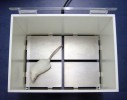Authors
J. Ferrier, M. Bayet-Robert, B. Pereira, L. Daulhac, T. Adler, et al.
Lab
Laboratory for Functional Genome Analysis (LAFUGA), Gene Center, Munich, Germany
Journal
Plos One
Abstract
Uromodulin-associated kidney disease, UAKD, summarizes different clinical features of an autosomal dominant heritable disease syndrome in humans with a proven uromodulin (UMOD) mutation involved. It is often characterized by hyperuricemia, gout, alteration of urine concentrating ability, as well as a variable rate of disease progression inconstantly leading to renal failure and histological alterations of the kidneys. We recently established the two Umod mutant mouse lines UmodC93F and UmodA227T on the C3H inbred genetic background both showing kidney defects analogous to those found in human UAKD patients. In addition, disease symptoms were revealed that were not yet described in other published mouse models of UAKD. To examine if further organ systems and or metabolic pathways are affected by Umod mutations as primary or secondary effects, we describe a standardized, systemic phenotypic analysis of the two mutant mouse lines UmodA227T and UmodC93F in the German Mouse Clinic. Different genotypes as well as different ages were tested. Beside the already published changes in body weight, body composition and bone metabolism, the influence of the Umod mutation on energy metabolism was confirmed. Hematological analysis revealed a moderate microcytic and erythropenic anemia in older Umod mutant mice. Data of the other analyses in 7-10 month-old mutant mice showed single small additional effects.
BIOSEB Instruments Used:
Aron Test or Four Plates Test (LE830),Rotarod (BX-ROD)

 Pain - Thermal Allodynia / Hyperalgesia
Pain - Thermal Allodynia / Hyperalgesia Pain - Spontaneous Pain - Postural Deficit
Pain - Spontaneous Pain - Postural Deficit Pain - Mechanical Allodynia / Hyperalgesia
Pain - Mechanical Allodynia / Hyperalgesia Learning/Memory - Attention - Addiction
Learning/Memory - Attention - Addiction Physiology & Respiratory Research
Physiology & Respiratory Research
 Pain
Pain Metabolism
Metabolism Motor control
Motor control Neurodegeneration
Neurodegeneration Cross-disciplinary subjects
Cross-disciplinary subjects Muscular system
Muscular system General activity
General activity Mood Disorders
Mood Disorders Other disorders
Other disorders Joints
Joints Central Nervous System (CNS)
Central Nervous System (CNS) Sensory system
Sensory system Bioseb on booth #14 at OARSI 2024 in Vienna
Bioseb on booth #14 at OARSI 2024 in Vienna 
